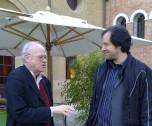
Remarks by Italian Legal Consultant shared with Partners
EFFACE project partners held their second project meeting at Sapienza University of Rome on 30-31 May 2013. The agenda included work to finalise the analytical framework which will underlie the project, initiating the research on instruments, actors and institutions relevant to environmental crime and planning for the interactive policy analysis activities to be launched later this year.
A special guest observer at the Rome meeting was Cristiano Ripoli, Legal Consultant to the Italian Parliament Special Committee of Enquiry on Counterfeiting and e-Crime, and Assistant Lawyer at the Italian General State Attorney Office. Previously he was a member of the Italian delegation to Eurojust in The Hague. EFFACE partners were provided with a summary of Dr. Ripoli’s remarks on “Transnational Environmental Crime: The Practitioners’ Point of View” made during a related workshop at the Institute for Environmental Security in The Hague on 7 May.
On that occasion Dr. Ripoli stressed that environmental crimes fall outside the classical criminological theories in the sense that they are predominantly transboundary and involve many actors, both legal and illegal, all with their own active interests in the chain of activities. Focussing on the illegal management and disposal of toxic waste, he said that some of the actors involved are highly specialised white collar criminals, who know exactly where and how to store, transport, dump or process the waste, where to make the false legal disposal and/or which officials to bribe.
“Especially the latter are dangerous”, Ripoli said. “You can have the best laws and the best instruments, but if the people who need to apply the law are bribed, you lose control of everything.”
Due to the complex international nature of environmental crime, it can be difficult to work together on the international level. Ripoli argued however that this is very important. It has to be realised that within the European Union, each member state still has its own system, waiting for the establishment of a European Prosecutor as prescribed in Article 86 of the Treaty on the Functioning of the EU.
Being aware of the involvement of other countries, authorities can start early cooperation using specialised channels such as Eurojust and Europol. This will help to bring the full dimensions and structure of the criminal organisations to the light, while at the same time exposing the limits of the existing legal frameworks.
The investigation of such strengths and weaknesses is central to the EFFACE research. Indeed, the main focus during the project meeting was on gaining ideas for stock-taking and analysis of the main instruments, actors and institutions which are relevant for the efforts of the EU to combat environmental crime. Also, methods to identify and select relevant stakeholders to engage in key issue debates were discussed. Combining these two tasks – and other research tasks during the project –will be the basis for the interactive policy analysis which should result in recommendations to better analyse and combat environmental crime.









